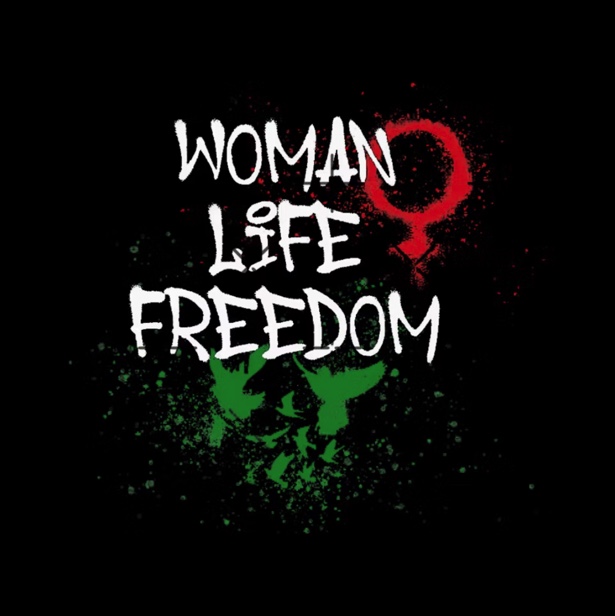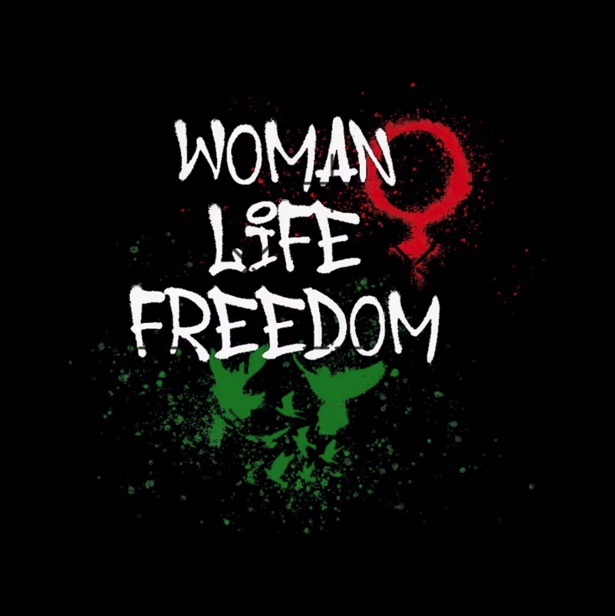2nd Anniversary of Woman, Life, Freedom
Iran

On 2nd Anniversary of Woman, Life, Freedom: Women and Human Rights Organization Urgently Call for Release of Women Human Rights Defenders and Upholding of Women’s Rights in Iran
September 16th marks the two-year anniversary of Mahsa Jina Amini’s tragic death while in the custody of the morality police. The 22-year-old Kurdish-Iranian woman was arrested in Tehran for allegedly violating Iran’s strict hijab laws. Her killing sparked the Woman, Life, Freedom uprisings, with women defiantly removing their hijabs at her funeral in Saqqez and feminist groups calling for protests. The movement quickly spread across Iran’s universities and cities.
The Woman, Life, Freedom movement in Iran represents a pivotal moment of resistance against Iranian authorities’ gender-based, ethnic, and social oppression. It united women, with the support of men, from diverse communities including Kurds, Baluchis, and other marginalized communities alongside educators, students, and activists in a collective fight for human rights. During the protests, security forces detained thousands of demonstrators, many of whom were tortured and some reportedly sexually assaulted. Ethnic minority regions faced particularly violent crackdowns. At least eleven protesters were later executed.
The mass imprisonment of at least 20,000 protesters, as estimated by human rights organizations, took place in dire conditions in Iranian prisons. Overcrowding, insufficient food, inadequate healthcare, and poor living conditions along with the judiciary’s inability to process the vast number of detainee cases, forced the Iranian government to announce a general amnesty in February 2023, releasing over 80% of those arrested, many of them protesters. Official reports indicate that at least 22,000 protesters were granted amnesty, underscoring the scale of the detention and subsequent release.
Despite the release of many protesters under the general amnesty, numerous activists, including feminist activists and women’s rights defenders, remain in prison or face imminent imprisonment. According to reports, these individuals were seen by Iranian authorities as key figures in igniting the protests and promoting feminist demands as a result of their long-time activism in support of women’s rights. Additionally, further arrests of activists occurred in the months following the initial wave of protests.
Over the past two years, Iranian women have persistently resisted and fought for their right to choose their own attire, defying the escalating brutality of the morality police, who returned to the streets after a brief hiatus. Women activists imprisoned across Iran have continued to courageously fight for their rights from within prison walls. Many consider these imprisoned women to be at the forefront of the struggle against human rights abuses and the driving force behind the enduring Woman, Life, Freedom movement.
Despite their long prison sentences, these imprisoned women human rights defenders remain steadfast in their support of civil society demands. Through hunger strikes, public statements, joint protest letters, and prison sit-ins, imprisoned women human rights defenders have revitalized the suppressed Woman, Life, Freedom movement. Their presence in public wards of prisons such as Lakan in Rasht, and their accounts of harsh conditions, have shed light on widespread prisoner rights violations and the dire state of Iran’s prisons. They have channeled their activism within prison walls, striving to improve conditions for all prisoners. From the notorious Evin in Tehran to Lakan in Rasht, Adel Abad Prison in Shiraz, and Sepidar prison in Khuzestan, their persistence is a powerful testament to their courage and commitment to women and human rights in Iran.
At least 25 women human rights defenders associated with the Woman, Life, Freedom movement are currently imprisoned, with many more facing imminent imprisonment following trials and appeals hearings. It is critical that these women not be forgotten as the movement is suppressed and international attention wanes.
We, the undersigned, honor the courageous efforts of these women human rights defenders who, alongside generations of Iranian women activists, have been pivotal in raising awareness and advocating for women’s rights in Iranian society.
We urge Iranian authorities to:
- Immediately and unconditionally release all the women human rights defenders imprisoned in Iran, as well as all other human rights defenders.
- End the systematic violence and discrimination against women.
- Acknowledge and uphold women’s rights to bodily autonomy and freedom of choice by repealing the compulsory hijab law, which has oppressed Iranian women for over four decades.
- Respect human rights by abolishing the death penalty, especially against women human rights defenders.
We also urge international and regional human rights organizations to follow up on the situation of detained women human rights defenders, press for their unconditional release, and demand that Iranian authorities ensure their safety and health while in detention.
We call on feminist groups and organizations to continue advocating for Iranian women’s rights and their demands for bodily autonomy through protests, peaceful gatherings, statements and advocacy efforts.
Signed:
- ARC-Asia Protection Network for Artists at Risk Connection
- AWID
- Femena
- Front Line Defenders
- Gulf Centre for Human Rights
- Human Rights Watch
- Kurdistan Human Rights Network
-
Kurdpa
- Miaan Group
- OMCT
- Regional Coalition of WHRDs in SWANA (MENA) Region
- Women Human Rights Defenders International Coalition (WHRDIC)
در دومین سالگرد جنبش زن، زندگی، آزادی: سازمانهای مدافع حقوق زنان و حقوق بشر خواستار آزادی فوری زنان مدافع حقوق بشر و حمایت از حقوق زنان در ایران شدند.
۲۶ شهریور، دوسال از کشته شدن مهسا ژینا امینی در بازداشت پلیس گشت ارشاد و اعتراضات گسترده متعاقب آن که منجر به ظهور جنبش زن، زندگی، آزادی در ایران شد میگذرد. اعتراضاتی که جرقه آن با اعتراض زنان و درآوردن روسریهایشان و سردادن شعار ژن، ژیان آزادی در مراسم خاکسپاری مهسا ژینا امینی و فراخوان تجمع اعتراضی گروههای فمینیستی در تهران آغاز شد و به سرعت به دانشگاهها و شهرهای مختلف ایران گسترش پیدا کرد.
جنبش زن، زندگی، آزادی نقطه تقاطع گروههای مختلفی از مردم تحت ستم در ایران و لحظهای مهم از مقاومت در برابر ستم جنسی- جنسیتی، قومی ، مذهبی، سیاسی و اجتماعی بود. لحظهای که زنان با حمایت دیگر مردم تحت ستم از کردها و بلوچها تا معلمان، دانشجویان و کنشگران در یک مبارزه جمعی علیه نقض حقوق اساسیشان با هم متحد شدند.
در جریان این اعتراضات هزاران نفر از معترضان دستگیر شدند، و دستکم ده تن از معترضان دستگیرشده اعدام شدند. بازداشت و حبس هزاران نفر در سراسر ایران که بر اساس تخمین سازمانهای حقوق بشری حداقل ۲۰ هزار نفر بودهاند، شرایط دشواری را در زندانها رقم زده بود. کمبود غذا و امکانات بهداشتی و حتی جای خواب و ناتوانی سیستم قضایی برای رسیدگی به پروندههای بازداشتشدگان در نهایت منجر به آن شد که در بهمنماه ۱۴۰۱ قوه قضاییه ایران، با اعلام عفو عمومی، بیش از هشتاد درصد دستگیرشدگان بدون سابقه پیشین بازداشت را آزاد کند. براساس آمارهای رسمی در جریان این عفو، دستکم
پرونده ۲۲ هزار نفر از معترضان مورد بخشودگی قرار گرفت. اگر چه در جریان این عفو عمومی هزاران معترض دستگیرشده آزاد شدند، اما بسیاری از کنشگران و به خصوص فمینیستها و زنان مدافع حقوق بشر که به باور نیروهای امنیتی ایران نقشی جدی در شعلهور شدن اعتراضات و فمینیستیشدن مطالبات داشتند، در زندان باقی ماندند و یا در ماههای بعدی دستگیر و زندانی شدند.
در دوسال گذشته
به موازات ادامه مقاومت و مبارزه روزمره زنان در خیابان برای تحمیل سبک پوشش انتخابیشان، آنهم برغم خشونتهای فزاینده پلیس گشت ارشاد که بعد از یک وقفه چندماهه بار دیگر به خیابانهای ایران برگشت، کنشگران زن زندانی در زندان های سراسر ایران نیز، مبارزه و مقاومت را از درون زندان ادامه داده و به باور بسیاری خط مقدم مبارزه علیه نقض حقوق بشر و ادامهدهنده جنبش زن، زندگی، آزادی بودهاند.
زنان زندانی با اعتصاب غذا، صدور بیانیه، نامههای اعتراضی جمعی و با تحصن در داخل زندان و رساندن صدای اعتراضشان به بیرون از زندان، جانی دوباره به جنبش سرکوبشده زن، زندگی، آزادی میبخشند و بهرغم احکام سنگین زندان، یک لحظه هم از پیگیری مطالبات جامعه مدنی پا پس نمیکشند. علاوه بر این، حضور این زنان در بندهای عمومی زندانهایی مانند لاکان رشت و روایتگری آنها در مورد شرایط زندان، نوری بر نقض حقوق زندانیان و وضعیت اسفبار زندانیان در زندانهای عمومی تابانده است. آنها در زندان نیز روحیه کنشگریشان را بهکار گرفته و تلاش میکنند تا وضعیت زیستی زندان را برای همه زندانیان بهبود بخشند. از همین رو است که در حال حاضر تعداد قابل توجهی از کنشگران مدافع حقوق زنان در زندانهای سراسر ایران تحمل کیفر میکنند. از تهران و زندان اوین گرفته تا رشت و زندان لاکان. از شیراز و زندان عادل آباد تا زندان سپیدار در خوزستان.
اکنون دستکم ۲۵ زن مدافع حقوق بشر در ارتباط با جنبش زن، زندگی، آزادی در زندان به سر میبرند و شمار دیگری نیز در دادگاهها محاکمه شده و در آستانه زندانی شدن هستند. زنانی که با خاموش شدن جنبش در خیابان و برداشته شدن نگاهها از وضعیت ایران، نامشان رو به فراموش شدن است.
ما امضا کنندگان این بیانیه، تلاشهای این زنان را ارج مینهیم که به همراه سایر نسلهای کنشگران زن ایرانی نقشی حیاتی در آگاهی امروز جامعه ایران در حوزه زنان دارند.
ما سازمانهای مدافع حقوق بشر از حکومت ایران میخواهیم:
- فورا و بدون قید و شرط تمامی مدافعان حقوق بشر زندانی در زندانهای ایران و از جمله این زنان مدافع حقوق بشر را آزاد کند.
- به سیاستهای تبعیضآمیز خود علیه زنان و خشونت سیستماتیک علیه آنها در خیابانها پایان دهد.
- حق انتخاب و آزادی زنان بر بدنشان را به رسمیت بشناسد و قانون تبعیضآمیز حجاب اجباری را که بیش از چهار دهه زندگی و روزمره زنان ایرانی را تحت تاثیر قرار داده است، لغو کند.
- مجازات غیرانسانی اعدام را لغو و به خصوص به صدور حکم اعدام علیه مدافعان حقوق بشری چون شریفه محمدی پایان دهد.
ما همچنین از سازمانهای حقوق بشری بینالمللی و منطقهای، میخواهیم که اخبار وضعیت دستگیرشدگان را پیگیری کنند، برای آزادی آنان به مقامات ایرانی فشار بیاورند. ما گروهها و سازمانهای فمینیستی را نیز فرا می خوانیم تا به شیوههای مختلف از صدور بیانیه تا برگزاری تجمع،
به حمایت از حقوق زنان ایرانی و مطالبه آزادی پوشش و خودمختاری جسمانیشان ادامه دهند.






